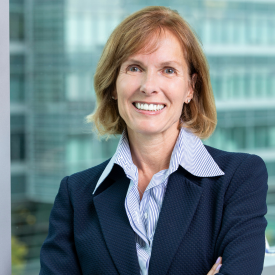You have identified climate and human health, mental health, and chronic disease as areas of importance to you. Why is now an important time to pursue new research and education in those fields?
In climate change and health, there's a sense that we're already behind as a society and not in front of the problem. This is a critical and emerging area that is going to have many transdisciplinary components. We need more scientifically trained experts to understand the consequences of climate change on human health and to inform programs that can mitigate harm.
Mental health has proved to be this daunting problem that cannot be ignored. We see the consequences of poor mental health throughout all aspects of our society. We need creative solutions, because thus far we've not had good answers for large-scale success with regard to the many aspects of mental health.
Chronic conditions as well as communicable conditions will always be with us. These aspects of public health are equally important – making a choice among them really isn't possible. You have to keep up with everything at once, prioritizing some for the immediate term.
How can ColoradoSPH reverse some of the confusion or negativity surrounding public health over the last few years?
A change of focus to the successful and vital role public health plays could help.
With COVID-19, our school informed government at every level – including the national level. We were on the phone with Governor Polis every single week providing data, modeling and resources throughout the entire state on how to manage the pandemic. I felt that our school was a national exemplar for how schools of public health can inform decisions to reduce harm.
On the other hand, the problem with public health and damaging its reputation is that: When public health policies and prevention measures aren't in place, it's super obvious to everybody. When it goes right, no one understands what the public health measures helped to prevent because the consequences have been averted. The individual person doesn't necessarily feel or can point to a public health benefit in their lives. But when they sit in their car, they're going to put their seatbelt on. They're going to read warning labels on products we consume. They feel the impacts of having health insurance, even if they are not employed. That’s where we can make a positive influence – a lot of people working together to prevent poor outcomes from ever happening, or reducing the harm that could have happened.
It’s not always a smooth process, but I think that if we can bring to light the rigor in public health and the way we ourselves message our work – and that part is on us – I think we can do a better job of selling public health’s importance. We have to do a better job of messaging the science and the underlying data, and how we use those data, how we do our studies and incorporate communities at risk into what we do.
But our goal is to get better. The goal is to make overall society better and healthier and stronger.
Given your background, are you looking to foster even more ties in collaboration between the ColoradoSPH and the CU Cancer Center?
Absolutely. Cancer is still the leading cause of death in Colorado. Few diseases lay bare the consequences of injustice, in exposures, prevention and treatment than cancer.
The risk factors of cancer are targeted to people who suffer from all kinds of disparities – including lack of insurance coverage and incredible costs for treatment. Cancer will remain an important area of investment for our health system. It's important for our school to align itself with the CU health system on priorities like cancer, as well as other emerging problems such as climate change. Remaining in step on the leading causes of mortality and disparities in our state will remain key.
How are you looking to expand student support as dean?
One obvious way is to expand our scholarship base and offer more funding opportunities for students, and expanding the resources available to them while they're participating in our education programs. But it's more than that. It's when they leave our education program, we need to be a resource for them to return to so that we can support a continuous learning model for our students.
The other thing that's important to me, in addition to financial support, is that we continuously ensure that we offer the best quality education experiences for our students.
Across the three universities of the ColoradoSPH, what areas of collaboration are you looking to boost?
Research of course is a natural intersection for collaboration. It's an area that we’ve certainly built and worked on. I think there are many opportunities around climate science and our work in community engaged research.
That said, there are also opportunities for shared learning experiences and public health pedagogy that can be enhanced by this tri-campus collaboration. There's much that we can learn from each other by having people in other institutions that are under this larger umbrella. It's a real opportunity to spring off of in addition to the nexus that research provides and gives us an opportunity to learn about new teaching approaches, presenting to public health leaders, and having a broader range of course offerings for our students.
How important is data and research-driven public health?
It’s absolutely critical that we continue to build the data infrastructure so that we can address problems in a more timely manner.
I'd like to add the word ‘sciences’ after public health. It is a rigorous science, and we have to collect data and be very systematic about the way in which we address public health problems, and the way in which we train our students. It's critical that we think of public health alongside every other science because public health is where the impact occurs.



.png)
.jpg)
